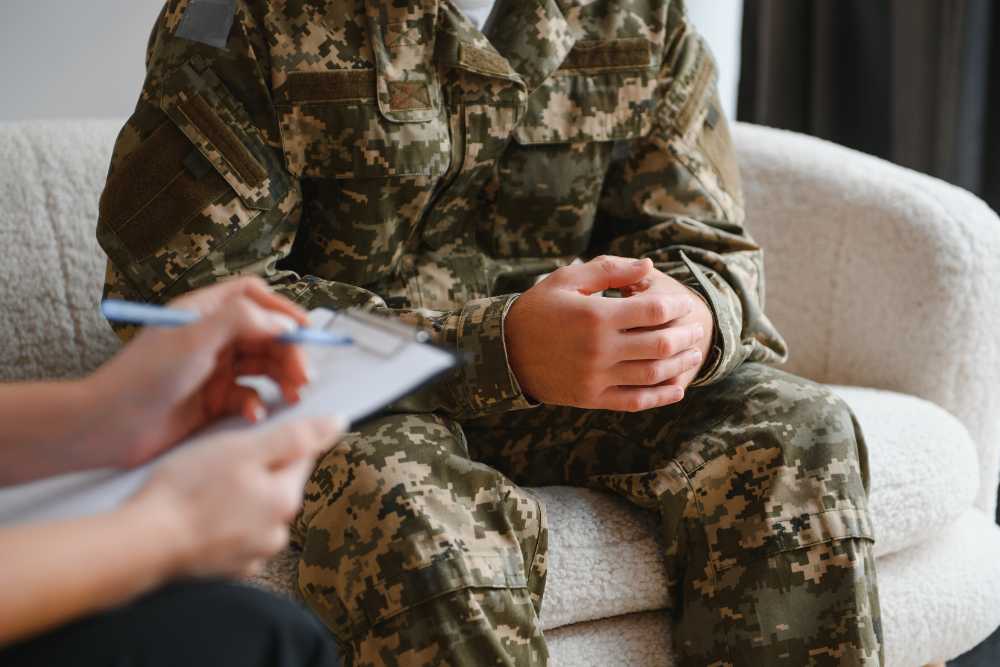Yes, ketamine infusion therapy shows promise for treating PTSD in military veterans, though it’s still considered an emerging treatment that requires more research. Ketamine operates differently from traditional antidepressants. It works on the glutamate system in the brain and may help reset neural pathways involved in trauma processing. Ketamine infusion therapy for military members and veterans can provide relatively rapid relief compared to conventional medications, which can take weeks to show effects.
Research indicates that ketamine can reduce PTSD symptoms, particularly when combined with psychotherapy. Some studies show significant improvements in symptoms like intrusive thoughts, hyperarousal, and avoidance behaviors. The effects can be noticeable within hours to days after infusion, though the duration varies between individuals.
The treatment for PTSD represents a potentially valuable tool, especially for veterans who haven’t responded to traditional therapies. Still, it’s best viewed as part of a comprehensive treatment approach rather than a standalone solution.

What Makes Ketamine Infusion Therapy a Promising Option for Veterans?
Ketamine infusion therapy as a veteran’s mental health program has several unique characteristics that make it particularly promising for veterans with PTSD. Unlike traditional antidepressants that take four to six weeks to work, ketamine can reduce PTSD symptoms within hours to days. For veterans in crisis or those who’ve been suffering for years, this rapid response can be life-changing and provide hope when other treatments have failed.
Ketamine works on the NMDA receptors and glutamate system rather than serotonin, like most antidepressants. This means it can help veterans who haven’t responded to SSRIs or SNRIs, which is a common scenario since many veterans have treatment-resistant PTSD.
Ketamine appears to promote neuroplasticity, which is the brain’s ability to form new neural connections. This may help veterans rewire trauma-related thought patterns and break the cycle of negative associations, especially when combined with therapy during the treatment window.
While promising, ketamine isn’t a cure-all.
Success rates vary, and the therapy is most effective when used as part of comprehensive care that includes psychotherapy, lifestyle modifications, and strong support systems. The key is that it provides another tool in the toolkit that works differently and may reach veterans when other approaches haven’t.
What PTSD Symptoms Can Improve With Ketamine Infusion Therapy?
Ketamine infusion therapy has shown potential to improve a wide range of PTSD symptoms, though individual responses vary:
Intrusive Symptoms
- Flashbacks and intrusive memories of traumatic events
- Nightmares and trauma-related dreams
- Emotional distress when reminded of trauma
- Physical reactions to trauma triggers
Veterans often report that the intensity and frequency of these intrusions decrease, making daily life more manageable.
Avoidance Behaviors
- Reduced tendency to avoid trauma-related thoughts, feelings, or conversations
- Increased willingness to engage with situations or places previously avoided
- Better ability to confront rather than escape reminders
Negative Alterations in Mood and Cognition
- Persistent negative beliefs about oneself or the world
- Emotional numbness or detachment
- Inability to experience positive emotions
- Loss of interest in activities once enjoyed
- Feelings of isolation from others
The benefits of ketamine therapy may include lifting this emotional fog and restoring the capacity for connection and pleasure.
Mental Health Treatment That Works
Call 949-625-0564What our customers are saying
How Does Ketamine Work in the Brain to Treat PTSD in Veterans?
Ketamine’s effects on PTSD involve several interconnected mechanisms in the brain. While research is ongoing, here’s what scientists currently understand:
Primary Mechanism: NMDA Receptor Blockade
Ketamine blocks NMDA receptors, which are involved in learning, memory formation, and neural signaling. In PTSD, trauma memories become over-consolidated, essentially burned too deeply into the brain’s circuitry. By temporarily blocking these receptors, ketamine may:
- Disrupt the retrieval and reconsolidation of traumatic memories
- Weaken the emotional intensity attached to trauma memories
- Create opportunities for new, less threatening associations to form
Glutamate System Activation
The NMDA blockade triggers a surge in glutamate, the brain’s primary excitatory neurotransmitter. This glutamate surge activates AMPA receptors, which sets off a cascade of beneficial effects:
- Increased production of brain-derived neurotrophic factor
- Formation of new synaptic connections
- Strengthening of healthy neural pathways
Neuroplasticity Enhancement
One of ketamine’s most exciting properties is its ability to rapidly promote neuroplasticity, which is the brain’s capacity to rewire itself:
- Synaptic growth: Ketamine stimulates the growth of new connection points between neurons within hours
- Neural flexibility: Makes the brain more adaptable and responsive to new learning
- Breaking rigid patterns: Helps dissolve the rigid, repetitive thought patterns characteristic of PTSD
For veterans, this means the brain becomes more receptive to forming new, healthier neural pathways that aren’t dominated by trauma responses.
Can Ketamine Therapy Reduce Suicidal Thoughts in Veterans With PTSD?
Ketamine therapy has emerged as a particularly valuable intervention for veterans with PTSD who experience suicidal thoughts, offering rapid relief when time is critical. Unlike traditional antidepressants that require weeks to take effect, ketamine can reduce suicidal ideation within hours of administration, making it potentially life-saving for veterans in acute crisis.
This rapid response occurs because ketamine works through the glutamate system rather than serotonin pathways, quickly promoting neuroplasticity and disrupting the rigid, negative thought patterns that fuel suicidal thinking. For veterans who have endured years of treatment-resistant PTSD and feel hopeless about recovery, this swift reduction in suicidal thoughts can provide immediate psychological relief and create a crucial opening for engagement with other therapeutic interventions.
Ketamine’s ability to rapidly increase brain-derived neurotrophic factor and restore synaptic connections helps reverse the neural damage caused by chronic stress and trauma, thereby enabling the brain to regain its capacity for hope and forward thinking.
Veterans often report that ketamine lifts the emotional numbness and sense of being trapped that characterizes severe PTSD, allowing them to reconnect with reasons for living and envision a future beyond their trauma. This makes ketamine an essential tool in comprehensive suicide prevention efforts for the veteran population, particularly for those who have not responded to conventional treatments.

Key Takeaways on Ketamine Infusion Therapy for Military
- Ketamine offers hope for treatment-resistant PTSD by working through a completely different brain mechanism than conventional antidepressants.
- Ketamine can improve a wide range of PTSD symptoms, including intrusive memories, flashbacks, nightmares, hypervigilance, avoidance behaviors, emotional numbness, and irritability.
- The therapy works by increasing the brain’s ability to form new neural connections and break free from rigid, trauma-dominated thought patterns.
- One of ketamine’s most critical benefits is its rapid reduction of suicidal thoughts, often within hours of infusion.
- While promising, ketamine works most effectively as part of a comprehensive treatment approach that includes trauma-focused psychotherapy.
Ketamine infusion therapy for military members and veterans can offer significant support for those grappling with PTSD. This innovative treatment aims to alleviate the symptoms associated with PTSD, providing a potential path to healing for those who have bravely served. For more information on how you can benefit from this therapy, reach out to Moment of Clarity in Southern California at 949-625-0564 today.
Resources
- National Library of Medicine – Effectiveness of Ketamine for the Treatment of Post-Traumatic Stress Disorder – A Systematic Review and Meta-Analysis
- Marketplace.va.gov – Resistance to Resilience: Rising Above Depression with Ketamine
- University of Michigan Medicine – Ketamine helped many severely depressed veterans, study shows




